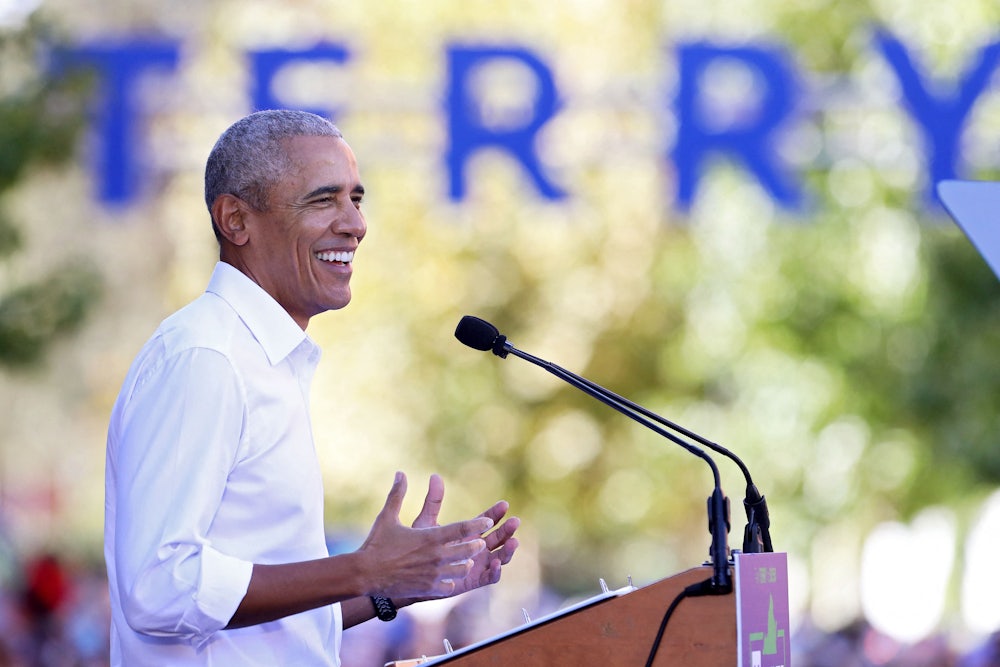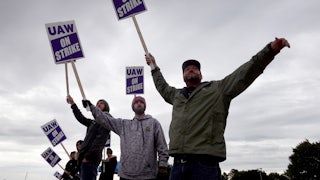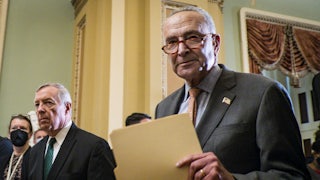The energy of the crowd outside the James Branch Cabell library at Virginia Commonwealth University was beginning to flag. It was a sunny Saturday in Richmond, the clear blue sky somewhat obstructed by pillowy white clouds; the weather comfortably cool, signaling that autumn had finally arrived in Virginia. The attendees had been standing for roughly three hours at this point, and some had chosen to sit down on the brick-and-concrete sidewalk as they listened to a campaign playlist that would not sound out of place at a suburban wedding venue, the thumping bass line absurdly loud as they waited for the final speeches of the rally to begin.
The rallygoers, a diverse mix of Richmond locals and curious VCU students, had already heard from a slew of Democratic politicians, beginning with a rousing speech from Richmond Mayor Levar Stoney and ending with one from Virginia Senator Tim Kaine, bedecked in a button-up shirt and a puffer vest, the fall uniform of middle-aged dads everywhere. Now, as Billy Joel crooned “Uptown Girl” from the massive speakers next to the makeshift stage, they waited with restless anticipation for the arrival of the event’s main attraction: former President Barack Obama.
With less than two weeks left before Election Day, Democratic gubernatorial candidate Terry McAuliffe—erstwhile seventy-second governor of Virginia, and aiming to become the seventy-fourth—is holding a series of events with the biggest names in the Democratic Party. Former Georgia gubernatorial candidate Stacey Abrams has rallied for McAuliffe, as has Vice President Kamala Harris and first lady Jill Biden. President Joe Biden will rally for McAuliffe on Tuesday.
When Obama finally took the stage on Saturday, wearing his standard campaign shirtsleeves and a megawatt smile, the crowd was bubbling with enthusiasm. Hundreds of phones flew into the air as attendees took shaky photos of the former president onstage, their cheers briefly drowning out his walk-on music. This was Obama in peak campaign form, loose and cracking jokes, telling screaming fans that he loved them too, and impressing upon voters the urgency of defeating Republican Glenn Youngkin—and by extension, Trump—at the polls.
Obama framed the election as a “turning point,” where voters have the option of choosing a “politics of meanness and division and conflict, of tribalism and cynicism,” or of “taking another path.”
“I believe you, right here in Virginia, are going to show the rest of the country and the world that we’re not going to indulge in our worst instincts. We’re not going to go back to the chaos that did so much damage, we’re going to move forward with people like Terry leading the way,” Obama said.
Recent polling has shown an uncomfortably tight race for McAuliffe. A Monmouth University poll released last week showed McAuliffe and Youngkin in a dead heat, each receiving 46 percent of support among registered voters. The most notable swing in support came from independent voters, who now supported Youngkin by 48 percent compared to 39 percent for McAuliffe, a dramatic change from September, when McAuliffe led Youngkin among independents. (At a similar point in 2017, a Monmouth poll showed Republican Ed Gillespie leading current Virginia Governor Ralph Northam among registered voters by one percentage point. Northam won the election by nine percentage points around two weeks later.)
“I’m worried about it being so tight, because it shouldn’t be tight,” said Joyce Davis, 64, who attended the rally on Saturday. “I think he’ll win, but people need to get out and make sure he’ll win.”
It’s already more difficult to motivate voters in an off-year contest, and Democrats fear that without the boogeyman of former President Donald Trump at the top of the ticket, it will be hard to convey the urgency of the election to voters fatigued by politics and an ongoing pandemic. With appearances from these party leaders, the campaign is hoping to lift McAuliffe and juice enthusiasm among voters ahead of Election Day.
Representative Don Beyer, who represents a northern Virginia district on the outskirts of D.C., told The New Republic on Thursday that it was extremely rare to elect a governor of the same party as the president; the last time it happened was in 2013, when McAuliffe defeated Republican Ken Cuccinelli. But Cuccinelli was more of a right-wing firebrand than Youngkin, whose mild-mannered and fleece-wearing persona may be more appealing to voters on the fence.
“Joe [Biden] won by 10 points. So we know our votes are there if we can get them out,” Beyer said. “I’m optimistic, but anything can happen. And a week is a long time in politics.”
Youngkin has more or less successfully walked the tightrope of appealing to Trump’s base; he has avoided campaign appearances with the controversial former president, who lost Virginia twice, and said that he believed Biden was legitimately elected. But he has also launched an “election integrity task force” and called for auditing voting machines, actions that echo baseless claims from Trump and his supporters that the 2020 presidential election was stolen.
Multiple speakers at McAuliffe’s rally on Saturday sought to tie Youngkin not only to Trump but to his most fervent, and violent, supporters. They denounced a pro-Trump event last week at which attendees pledged allegiance to a flag they said was carried during the January 6 insurrection at the U.S. Capitol; Youngkin was not in attendance at that event and called the pledge “weird and wrong.” (However the event’s organizers told The Washington Post that Youngkin had thanked them for setting it up.)
Jaime Harrison, the Democratic National Committee chair, called Youngkin a “fanboy” of Trump in a speech at Saturday’s rally. Representative Bobby Scott said that “we can’t afford to let Glenn Youngkin and Trump Republicans drag us backwards.” McAuliffe said in his speech that Youngkin was just “Donald Trump in khakis” and a “lapdog” to the former president. Obama accused Youngkin of portraying himself as a “regular ol’ hoops-playing, dish-washing, fleece-wearing guy,” while quietly accepting support from some of the most extreme factions of the Republican Party. (Youngkin, who played college basketball, posted a video to Twitter on Saturday challenging Obama to a one-on-one game.)
“Either he actually believes in the same conspiracy theories that resulted in a mob, or he doesn’t believe it, but he’s willing to go along with it, to say or do anything to get elected. And maybe that’s worse, because that says something about character,” Obama said.
Democrats have been quick to point to Youngkin’s private comments as evidence that he is less of a moderate than his campaign persona would suggest. In a leaked video from an event over the summer, Youngkin said that he would go “on offense” against abortion providers once elected but that he “can’t” talk about it on the campaign trail because “that won’t win the independent votes that I have to get.” The Daily Beast also reported last week that Youngkin had recorded a speech for a June event sponsored by a far-right group and featuring speakers promoting right-wing conspiracy theories.
And the former president remains an important motivator for Democratic turnout. Lauren, a 25-year-old attendee of the rally who voted early for McAuliffe, told The New Republic after the event that she was motivated to vote because “I don’t want anyone like Trump here.”
“I was also very surprised and scared by how close the last personal presidential election was,” she said. “And, you know, Youngkin stands for shitty things, like anti-choice and anti-gay rights.” (Youngkin indicated in a recent interview with the Associated Press that he did not support same-sex marriage but that it was “legally acceptable” in Virginia and that he “will support that” as governor.)
With the closeness of the race underlying every speech, Obama and other speakers urged the crowd to vote early and to encourage their friends and families to turn out, as well. “I know a lot of people are tired of politics right now,” he said. “We don’t have time to be tired. What is required is sustained effort.”
While McAuliffe and the Democrats who have campaigned with him have sought to nationalize the race, Youngkin has tried to keep it local, focusing on red-meat issues for the Republican base. Last week, he pledged to “ban” critical race theory, an educational framework that posits that a history of structural racism has affected American society and politics. Several Republican-led states have banned critical race theory in recent months, leading to broad laws that have raised confusion among school systems left to implement them. (In Texas, a school supervisor came under fire for saying that teachers had to balance books about the Holocaust with those showing “other perspectives,” in response to the new law.)
In an impromptu scrum with reporters ahead of the rally speeches, Democratic National Committee chair Jaime Harrison said that “if we get the Democrats to turn out, we win.” Democrats might be feeling complacent with their party in control of the White House, the House, and the Senate. “You’ve got to juice them up a little bit. Let them understand what is at stake,” Harrison said.
Laura, an 18-year-old student at VCU at the event on Saturday, told The New Republic in a brief interview that she had attended the rally “mainly because I wanted to see Obama,” and that she found the former president’s speech “really motivating.” She has not voted yet but plans to support McAuliffe.
In his speech on Saturday, Obama repeated a refrain first used as he campaigned for Hillary Clinton in the 2016 election: “Don’t boo, vote.” That election was defined in some small part by Democratic apathy. If there is a similar enthusiasm deficit in the Virginia gubernatorial race, it will be disastrous for McAuliffe.
“Booing might make you feel better, but it won’t get Terry elected,” Obama said. “I want you to get fired up inside, and then go vote.”






